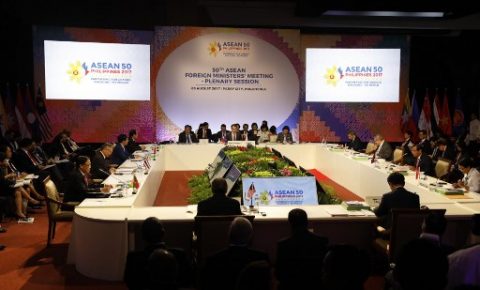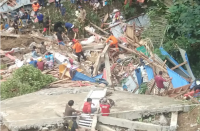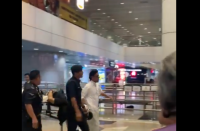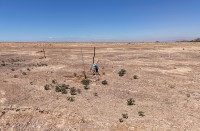
Vietnam urged other Southeast Asian nations to take a stronger stand against Chinese expansionism in the South China Sea, as a tense regional security forum began on August 5 with North Korea also under fire over its nuclear program. / AFP PHOTO / POOL / Erik DE CASTRO
MANILA, Philippines (Eagle News) – The foreign ministers of the Association of Southeast Asian Nations “reiterated” their “grave concerns over the escalation of tensions in the Korean Peninsula” including the most recent intercontinental ballistic missile (ICBM) tests of North Korea on July 4 and 28, and two other nuclear tests last year.
The “ASEAN Foreign Ministers’ Statement on the Developments in the Korean Peninsula” issued on Saturday, August 5, during the opening of the ASEAN foreign ministers’ meeting, stressed how “these developments” in North Korea “seriously threaten peace, security and stability in the region and the world.”
In their statement, the 10 ASEAN foreign ministers also “strongly urged” North Korea to “immediately comply fully” with its obligations under all relevant United Nations Security Council resolutions, and also called for the “complete, verifiable and irreversible denuclearization of the Korean Peninsula in a peaceful manner.”
This came about as the UN Security Council declared that it is set to vote Saturday on a US-drafted resolution toughening sanctions on North Korea.
This UN sanction up for voting included a proposed ban on certain exports that could deprive Pyongyang of $1 billion in annual revenue.
-ASEAN wants complete, irreversible “denuclearization of Korean Peninsula”
The ASEAN Foreign Ministers stressed the importance of establishing “permanent peace in the Korean Peninsula” and supported moves for a dialogue to de-escalate tensions in the region in their collective statement issued in Manila during a regional meeting that also commemorated the 50th anniversary of ASEAN.
“We reiterate our support for the complete, verifiable and irreversible denuclearization of the Korean Peninsula in a peaceful manner, call for the exercise of self-restraint, and underscore the importance of creating conditions conducive for dialogue to de-escalate tensions,” the ASEAN Foreign Ministers’ Statement said.
“We support initiatives to improve inter-Korean relations towards establishing permanent peace in the Korean Peninsula. ASEAN stands ready to play a constructive role in contributing to peace and stability in the Korean Peninsula,” it said.
The ASEAN Foreign Ministers also called upon North Korea as a participant of the ASEAN Regional Forum (ARF) to “realize the ARF Vision to maintain the Asia-Pacific as a region of lasting peace, stability, friendship and prosperity.”
Their statement said that only a region of lasting peace and stability where “States and organizations, both within and outside the region work in a spirit of mutual trust, appreciation and respect” can they “overcome security threats and challenges and prevent escalation of potential conflicts.”
This, their statement said, is with a “view to creating an environment conducive to sustainable development, social progress and improved quality of life for all peoples in the region.”
-Second ASEAN statement of concern on North Korea’s nuclearization
Department of Foreign Affairs spokesperson Rob Bolivar, in a press conference after the ASEAN statement on the Korean Peninsula was issued, said that this is the second statement made by the ASEAN so far regarding the developments in North Korea. The first was the ASEAN Chairman’s statement in April.
“The ASEAN has always been consistent on its position on the Korean Peninsula issue,” Bolivar said.
“In fact, this is the second statement we have issued during our chairmanship here on the DPRK, of course, noting the fact that the North Koreans have tested more weapons in the past couple of months of 2017, than in the years previously,” he said.
Bolivar said the Philippines as ASEAN chair is very concerned about the North Korea missile tests, as there are more than 58,000 Filipinos working in South Korea. The Korean Peninsula is also very close geographically to the Philippines.
With the ASEAN Foreign Ministers’ Statement on the Korean Peninsula, he said that ASEAN hopes to give a “strong voice” on the issue.
US Secretary of State Rex Tillerson had earlier urged China and other Asian countries to take tougher action against North Korea.
He will stress this when he attends the ASEAN Regional Forum in Manila.
-Tillerson to talk to China FM on North Korea in Manila meeting
Tillerson also hopes to engage China’s foreign minister Wang Yi at the ASEAN meeting here, said Susan Thornton, the acting assistant secretary of state for East Asia.
But she also said that Tillerson had no plans to meet North Korea’s foreign minister in Manila.
Tillerson had earlier said that the US is willing to sit down for talks with North Korea, but stressed that its pursuit of nuclear weapons was an “unacceptable threat to us.”
“We are trying to convey to the North Koreans, ‘We are not your enemy, we are not your threat, but you are presenting an unacceptable threat to us and we have to respond,” Tillerson said earlier in Washington. “We would like to sit and have a dialogue about the future.”
The ASEAN foreign ministers’ statement is the strongest ASEAN statement so far on the issue, and also reflected the United States’ position against North Korea’s nuclearization efforts.
N.Korea still part of ASEAN Regional Forum; ASEAN wants conducive candid face-to-face dialogue
DFA spokesperson Bolivar said it was still important to engage everybody in dialogue, including North Korea, which is the spirit of the ASEAN Regional Forum, he said.
“ASEAN wants North Korea to know that ASEAN remains concerned about what it is doing, and also we want to engage North Korea in a face-to-face candid dialogue on what is happening on the Korean Peninsula because, as the statement mentioned, we hope that this dialogue will help de-escalate the tensions. So we are banking on a candid discussion of the issue,” he said.
Bolivar also noted that the ARF might be the few events where that could be achieved with North Korea, and where representatives of the ASEAN region and its partners, including China, Russia and the US, are present.
The ASEAN foreign ministers want that conducive atmosphere, he said, since the ARF might the be only venue outside of the UN where all representatives of the concerned parties are on one table. This, they want to happen on August 7 during the ARF.
“The ASEAN Regional Forum, outside of the United Nations, is probably the only forum where you have the relevant parties around the table to discuss these issues. So for now, we would hope that the ASEAN regional forum will provide that conducive atmosphere; meaning the ARF on August 7 will provide that conducive atmosphere for dialogue on the Korean peninsula,” Bolivar said in a media briefing Saturday.
As to the alleged wish of the US for North Korea to be downgraded or excluded in the forum, this is not yet possible, explains Bolivar who have attended the ASEAN Regional Forum since 1997.
“I know there are criteria for selecting which countries are admitted into the forum, but I personally have yet to see any hard and fast rule to say that we can ask this country to exit,” he said.
“Of course, if the DPRK wants to exit that is their prerogative, but since ARF is an ASEAN-related mechanism, it operates on the basis of consensus so we have to have everyone on board on any decision that we make,” he added.
(Eagle News Service)







